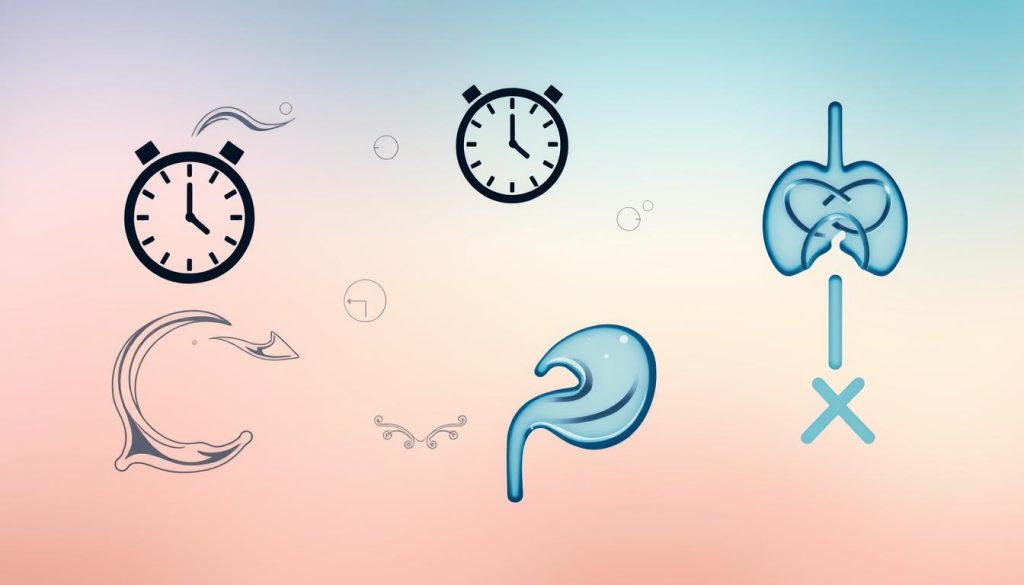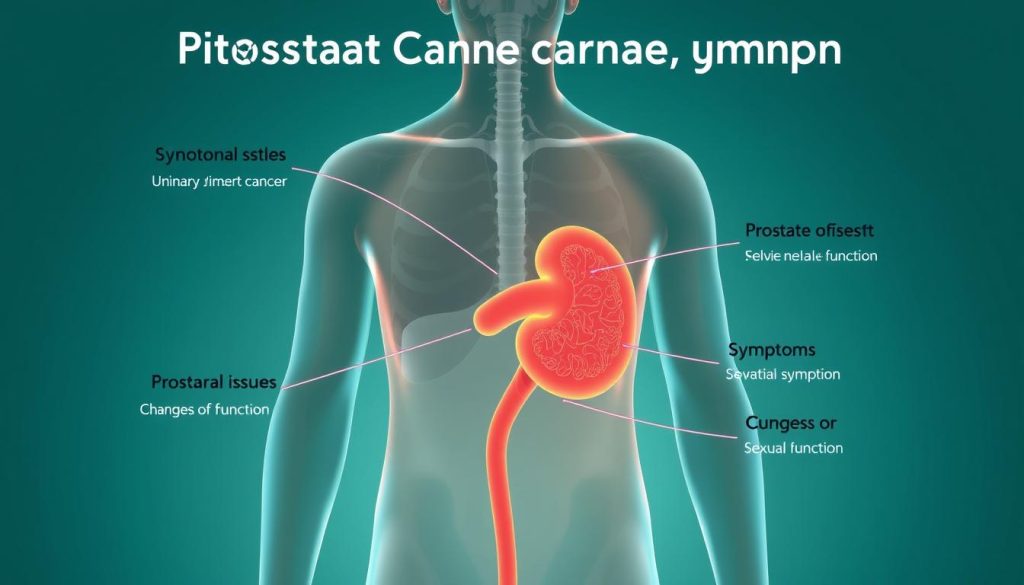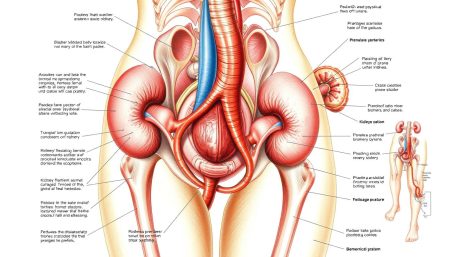Spotting prostate cancer symptoms early is key to effective treatment. This guide covers the signs of prostate issues, from small urinary problems to serious ones. Knowing these symptoms helps men get medical help on time and may improve their health outcomes.
Prostate cancer usually grows slowly, with symptoms showing up over time. Men might notice changes in how they urinate or feel discomfort in the pelvic area. These signs don’t always mean cancer, but seeing a doctor is important. Let’s look at the different prostate cancer symptoms to help you stay informed and proactive about your health.
What Are The Symptoms Of Prostate Cancer
Prostate cancer signs can be hard to spot early. It’s important to know these signs to get help quickly. Let’s look at the main signs that might mean you have prostate cancer.
Early Warning Signs and Symptoms
In the beginning, prostate cancer might not show any symptoms. Some men might notice changes in how they pee or feel pain in their pelvis. Going for regular check-ups and screenings is key. They can catch problems early, before you start feeling symptoms.
Common Urinary Symptoms
Changes in how you pee are common signs of prostate cancer. These include:
- Frequent need to pee, especially at night
- Hard time starting or stopping pee
- Pee that’s weak or stops and starts
- Seeing blood in pee or semen

Physical Discomfort and Pain Signals
As cancer gets worse, men might feel:
- Pain or burning when peeing
- Pain in the pelvis
- Pain in the lower back, hips, or thighs
These symptoms can also mean other prostate problems. If you notice any, see your doctor right away.
| Symptom | Early Stage | Advanced Stage |
|---|---|---|
| Urination Frequency | Slightly increased | Significantly increased |
| Pain | Mild discomfort | Severe pain in pelvic area and bones |
| Blood in Urine | Rare | More common |
Knowing these symptoms can help find prostate problems early. Remember, not all pee changes mean cancer. But, they should still be checked by a doctor. Regular visits and talking openly with your doctor are important for your prostate health.
Understanding Urinary Changes and Prostate Problems
Prostate issues often cause urinary problems that affect daily life. Men should watch their urine habits closely. This can signal prostate health concerns.
Frequent Urination Patterns
Frequent trips to the bathroom, especially at night, are common signs. This can disrupt sleep and daily routines.

Difficulty Starting or Stopping Urination
Problems with starting or stopping urine flow are common. Some men may have trouble beginning or finishing urination. These signs can point to an enlarged prostate or other issues.
Weak Urine Stream Concerns
A weak or interrupted urine stream is another warning sign. Men might notice a decrease in urine flow or interruptions. These changes should not be ignored.
| Urinary Symptom | Possible Indication | Action Required |
|---|---|---|
| Frequent urination | Enlarged prostate | Consult urologist |
| Difficulty starting urination | Prostate obstruction | Medical evaluation |
| Weak urine stream | Prostate inflammation | Diagnostic tests |
It’s key to understand these urinary changes for early prostate problem detection. If you notice any symptoms, see a healthcare professional for evaluation and treatment.
Sexual Function Changes and Related Symptoms
Prostate cancer symptoms often go beyond just urinary issues. They can affect a man’s sexual life too. These changes might be early signs of prostate health problems.
Erectile dysfunction is a big warning sign. Men might find it hard to get or keep an erection. This can hurt their sexual relationships. It’s easy to miss these changes at first.
Some men also see a drop in their sexual desire. This could be due to hormonal changes from prostate issues. It’s important to talk about these changes with a doctor.
“Changes in sexual function can be distressing, but they’re important clues for your health. Don’t hesitate to speak up about these concerns.”
Pain during ejaculation is another sign. If you feel pain when climaxing, it might mean your prostate is inflamed. Catching prostate cancer early can help with treatment.
- Difficulty achieving or maintaining erections
- Reduced sexual desire
- Pain or discomfort during ejaculation
- Changes in ejaculation volume or consistency
These symptoms don’t always mean prostate cancer. But, they do need a doctor’s check-up. Regular visits and talking openly with your doctor are key for prostate health.
Advanced Prostate Cancer Warning Signs
Prostate cancer that has spread can cause more obvious symptoms. These signs show the cancer has moved beyond the prostate. It’s key to notice these warning signs early for timely medical help.
Bone Pain and Discomfort
Advanced prostate cancer can spread to bones, leading to pain. This pain often hits the hips, back, or chest. If you have ongoing pain in these spots, see your doctor right away.
Unexplained Weight Loss
Unexplained weight loss can signal advanced prostate cancer. If your weight changes without diet or exercise changes, get medical advice. This symptom, along with others, needs immediate attention.
Fatigue and General Weakness
Feeling very tired or weak can be a sign of advanced prostate cancer. This tiredness lasts even with enough rest. If you’re tired a lot and have other symptoms like pelvic pain, talk to your doctor.
FAQ
Q: What are the early warning signs of prostate cancer?
A: Early signs of prostate cancer include frequent urination and trouble starting or stopping. You might also notice a weak urine stream or blood in your urine. But remember, these symptoms can also mean other prostate issues, not just cancer. So, getting regular prostate screenings is key to catching it early.
Q: How does prostate cancer affect urinary function?
A: Prostate cancer can really mess with your urine flow. You might find yourself needing to pee more, especially at night. Or, you could have trouble starting or keeping a steady stream. This is because the tumor can press on the urethra, blocking the way.
Q: Can prostate cancer cause pain?
A: Yes, prostate cancer can cause pain, especially when it’s advanced. You might feel pain in your pelvis, lower back, hips, or thighs. Bone pain can also happen if the cancer spreads. But, early-stage cancer usually doesn’t hurt, making regular check-ups super important.
Q: How does prostate cancer affect sexual function?
A: Prostate cancer and its treatments can mess with your sex life. You might struggle with getting an erection, which could be due to the cancer or treatment side effects. Some men also notice changes in ejaculation or feel less interested in sex. Talking about these issues with your doctor is crucial.
Q: What are the symptoms of advanced prostate cancer?
A: Advanced prostate cancer can cause a lot of pain and other symptoms. You might feel bone pain, lose weight without trying, or get really tired. Swelling in your legs or changes in bowel habits can also happen. These signs mean the cancer has spread and you need to see a doctor right away.
Q: Is blood in the urine always a sign of prostate cancer?
A: Blood in your urine can be a sign of prostate cancer, but it’s not always the case. It can also mean other things like infections, stones, or BPH. Still, if you see blood in your urine, you should get it checked by a doctor fast.
Q: How often should men get screened for prostate cancer?
A: How often you should get screened for prostate cancer depends on your risk and age. For most men, talks about screening start at 50. But, if you’re at higher risk, like African American men or those with a family history, it might be earlier, around 45. Always talk to your doctor about when you should get screened.
Q: Can prostate cancer develop without any symptoms?
A: Yes, prostate cancer can grow and spread without causing symptoms, especially in the early stages. That’s why regular screenings are so important, especially for men over 50 or those with higher risk factors. Tests like PSA and digital rectal exams can find cancer before you notice any symptoms.


















